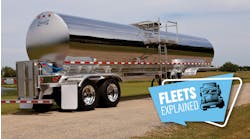Mack Trucks’ leaders said they made progress on local union contract negotiations this week but said the national United Auto Workers’ leadership continues to make “unrealistic” economic demands at the master contract level. After three days of discussions, both sides have left the bargaining table with no more talks scheduled.
“Mack stands by the economic terms of its Oct. 1 tentative agreement with the union, which UAW leadership endorsed and called a ‘record’ contract for the heavy truck industry,” reads an Oct. 27 statement from Mack Trucks.
Thousands of UAW members have spent the fall on picket lines after walking out on plant jobs with the Detroit Big Three automakers and Mack Trucks, a Volvo Group subsidiary. On Oct. 25, UAW leaders announced a tentative agreement with Ford Motor Co.
See also: UAW strike extends to another truck plant
UAW VP Chuck Browning called the new Ford deal the “most lucrative agreement” UAW has achieved in more than 50 years. That deal tentatively puts 20,000 of the more than 45,000 union members back to work. However, the union leaders continue to fight for wage and benefit increases with three major U.S. vehicle manufacturers: General Motors, Stellantis, and Mack.
Nearly 4,000 UAW workers at four Mack facilities in three states have been on strike since Oct. 9.
“While we still have a long way to go, I am cautiously pleased with the progress made at the local table and have some optimism that within the next 24 hours, we can get to the main table and work on the Master Agreement—to press for your demands on general wage increases, COLA, and benefit protection and expansion,” David Durgin, UAW Local 1247 bargaining council president, said on Oct. 24 about Mack negotiations. “Whether that happens is entirely up to the company.”
UAW Local 1247 represents workers at Mack’s Hagerstown, Maryland, plant, where it develops and builds Mack heavy-duty diesel engines, transmissions, and drivelines.
Late this week, Mack leaders noted the progress made with local unions but said: “UAW leadership’s economic demands at the master contract level continue to be unrealistic.”
The OEM said no more negotiations are scheduled as of Oct. 26. Mack noted what the current offer to union workers includes:
- The average wage increase over five years would be 36%, with an average immediate wage increase for all covered employees of nearly 15%.
- For employees not yet at the top rate—nearly half the workforce—the average increase over five years would be 55%, and the average immediate wage increase would be more than 20%.
- Most employees already at the top rate would receive an immediate wage increase of 10% and up to 20% compounded over five years, even though company research shows these employees are already above market rates.
- Premiums for the company’s healthcare coverage—which have not increased in more than six years despite a 66% increase in costs over the last decade—would remain unchanged for five more years.




